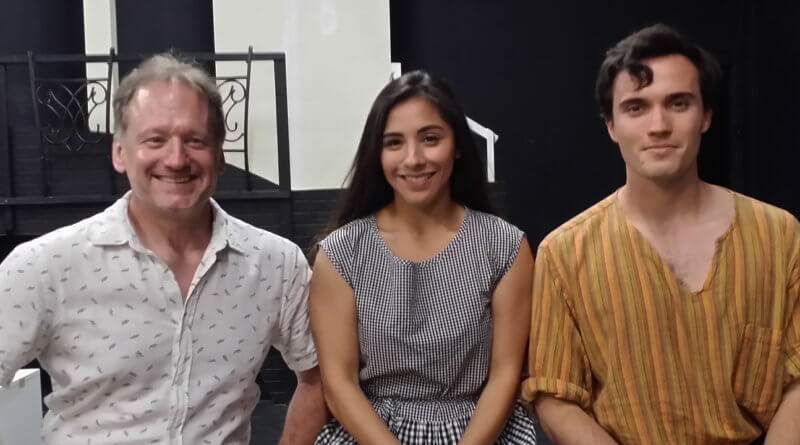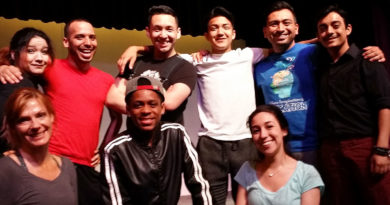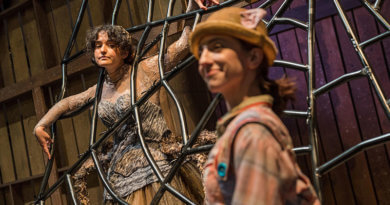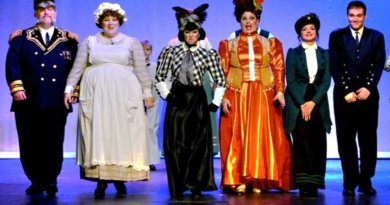Interview: The Director and Leads of ‘Romeo and Juliet’ at the Classic Theatre
Raising the curtain on the Classic Theatre’s twelfth season next week is Shakespeare’s timeless Romeo and Juliet. Directed by Joe Goscinski, who helmed last year’s A Midsummer Night’s Dream, this production probes the Bard’s text to uncover the themes that resonate most with modern audiences. In keeping with today’s political climate, walls — both literal and symbolic — figure prominently in this contemporary production.
The director and his leads, Alyx Gonzales (Juliet) and Josh Davis (Romeo), took time to speak with ArtScene SA before rehearsal this week about the piece and its enduring relevance.
Upon arriving at the theater, I couldn’t help but notice the multicolored graffiti written all over the interior walls. Goscinski explained:

“The designer asked us to write anything we felt about the Montagues and the Capulets. I told the cast, ‘If anything offends you, wipe it off. Write over it.’ We’ve started a common dialogue here.
“We’re going to be painting [the interior walls] over, but we’re going to leave the chalk up on the back walls. We’re also going to leave chalk in the lobby for people to write whatever they’re feeling, whether it be political or emotional. If they want to voice it, they can put it on the wall.
The director explains the impetus for this idea. “I live in New York, and when President Trump was elected, people started writing Post-It Notes and putting them up in Union Square — what they felt about the election and the outcome. There would be a lot of messages that were anti-Trump, but then there would be some that were pro-Trump. Then people would come back and put something else over or around them. Soon, the entire subway station was covered in Post-Its.”
The production is also utilizing walls as symbols of discord and separation. “We’re playing the idea of the border between Mexico and the United States into this as a wall that divides two peoples,” he said. “I think there’s a lot of emotion in our culture and our politics today. In between that, there are those who love each other despite their differences.
“I’m big on impulse directing, and I really wanted to get people to become immersed in an issue. The world we’re trying to build around us here is one that expresses emotions like hate and passion. And in the middle, we have Romeo and Juliet who don’t care about all that — just their love for each other. They’re willing to fight and even give their lives to be together.”
What Goscinski asks of his actors is to let him hear the play. “Not that I haven’t heard it before, but I want to be awakened and hear ideas and be affected. I want the actors to understand more about themselves by the words they speak. When I hear these two fine actors [Gonzales and Davis] talk about being ‘banished,’ it makes me understand what it feels like to be apart from someone I love.”

Gonzales had this to say about her character:
“When I think of Juliet, I think of youth. I think of a variety of loves: romantic love, parental love…passion. I think she stands for women as a whole, and I think she’s a lot stronger than people give her credit for.
On playing the part, Gonzales said: “One of the biggest challenges is allowing the language to do what it does — letting the words speak themselves instead of forcing them. Sometimes I get into the mindset that I have to work hard pushing the words — but you don’t. It’s worked for 400 years because it’s so well written. You just have to trust what is there.
“What’s been really exhilarating is discovering the relationship I have with Josh,” she added. “This is the first time we have ever done Romeo and Juliet, so what is our chemistry; what is our connection? What do we bring to the table in this particular production? That’s been really fun to explore — how we mesh and how our Romeo and Juliet work together.”
Davis, who is making both his Classic Theatre and San Antonio debuts, added his thoughts:
“For me, it’s the journey of Romeo from a boy to a man when he falls in love with Juliet. He starts out not knowing what love is. He’s heard of it and he’s read about it, but he hasn’t experienced it. He discovers this love through Juliet. Then, through the trials they go through, he matures and finds out what it means to be a man.”
And the challenges? “Well, the world knows Romeo. Everyone has an image of him. When you think of Romeo, you think of a certain thing. To discover my Romeo was both challenging and exhilarating — to put away all the preconceived notions of who Romeo is and to find him in the text and other characters. Certainly the most exhilarating part is being able to fall in love each time we play it. Falling in love is brilliant, and I get to do it each time we run the show.”
About the relevance of the piece today, Goscinski said, “As a director, I go into this play knowing that it is very well-known. It’s one of the first plays students are asked to read. I know that people know what’s going to happen, but will they understand it more thoroughly by the time they leave? I think they will. I think they’ll come out and say, ‘Oh! This play’s not just about Romeo and Juliet, but also about the lack of understanding from the people around them.’ It’s not just a bunch of ‘thees’ and ‘thous.’ It’s about understanding humanity.
Goscinski considers Romeo and Juliet to be an especially topical piece today. “Nothing good comes from hate, and there’s such a lack of empathy and compassion, because compassion is empathy in action. We need to understand that such problems have existed for hundreds of years, and we still need to work together as a society to seek resolution and make the world right. We should be better human beings.”
Romeo and Juliet plays Fridays and Saturdays at 8:00 p.m. and Sundays at 3:00 p.m. at the Classic Theatre of San Antonio, 1924 Fredericksburg Rd. Reservations can be made online or by calling (210) 589-8450.
Feature photo (l-r): Joe Goscinski, Alyx Gonzales and Josh Davis.




